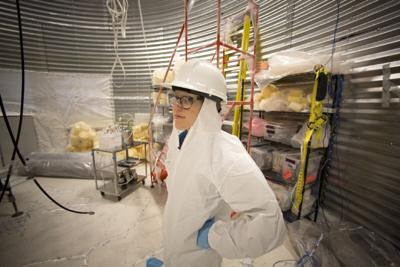This story is part of the Starās trust initiative, where, every week, we take readers behind the scenes of our journalism. This week, we focus on how Kate Allen, the Starās Science & Technology reporter, checks the facts when reporting on the latest news in her beat.
In an era when scientific research is coming under ever-increasing scrutiny ā and attack ā by some politicians and interest groups, the obligation for reporters on the science beat to āget it rightā is paramount.
Kate Allen, the Starās Science & Technology reporter for the past five years, is keenly aware that stories she covers, particularly if they involve scientific studies, will likely be subjected to critical examination. That they must stand up to such scrutiny is crucial to reader trust.
Science & Technology is a challenging beat, but one for which Allen has developed a number of checks and balances to ensure her readers are getting accurate, fair, but also interesting science news.
When it comes to reporting on studies, for which story pitches inundate her inbox, she says, journalists have to be careful. One of the first things sheāll do if a study looks interesting is send it to researchers who are experts in the field, but who werenāt involved in that particular study.
āIāve killed lots of stories after researchers told me the study I wanted to write about was flawed or overhyped,ā Allen said in an interview, noting she has also learned to be skeptical whenever she sees any claims that a study has found a ācureā or made a ābreakthrough.ā
āThe truth is that good science is incremental and often really slow. Big, flashy breakthroughs are rare. More often, one piece of research builds on another until we have a slightly less hazy picture of whatās going on,ā she explained. āThough I donāt cover medical science, itās especially dangerous to throw around the words ācureā or ābreakthroughā and give people false hope about eliminating diseases.ā
Allen says she is trying to spend less time reporting on studies, given that high-profile research usually get lots of media coverage.
āI donāt think itās a good use of my time to write the 101st story about the latest study in Science or Nature, unless itās truly a breakthrough or is just too irresistible to miss,ā Allen explained. āIām trying to spend more time hunting for stories that wouldnāt get reported on at all otherwise.ā
So, how does Allen choose the topics she writes about?
She looks for stories that are just plain fascinating, she says, and relevant to readersā lives.
For example, in 2015, Allen profiled Geoffrey Hinton, a University of pc28¹ŁĶųprofessor widely considered the godfather of a type of artificial intelligence known as ādeep learningā that has transformed how computer applications such as language translation and image recognition work. Think machines that understand verbal commands or self-driving cars.
Then there are stories about changes happening in the natural world. Last month, Allen took a deep dive into how climate change has shifted where . The result is a massive global shakeup with costly consequences for our own species.
But when it comes to reporting on scientific research, which is often funded by governments, reporters can come up against political pushback.
It can be a hostile world. Just last month, the Washington Post reported the U.S. Centers for Disease Control and Prevention was warned by the administration of U.S. President Donald Trump not to use seven words, including āscience-based,ā āevidence-basedā and ātransgender,ā in 2018 budget documents.
Even in Canada, the Conservative government under former prime minister Stephen Harper faced heavy criticism when it was accused of gagging scientists in federal agencies and institutions by implementing strict guidelines surrounding what they could say publicly about their research.
All the more reason for people to be presented with facts to help them form their opinions and live their lives, says Allen.
Most scientific research is by definition of interest to the public, she said. āFor one, Canadians pay for it with their taxes. For another, scientific developments either help explain, or actually cause, the ways that the world is changing.
āBut often my test for whether to cover a story or not is just how excited I get to learn about the research myself.ā

























